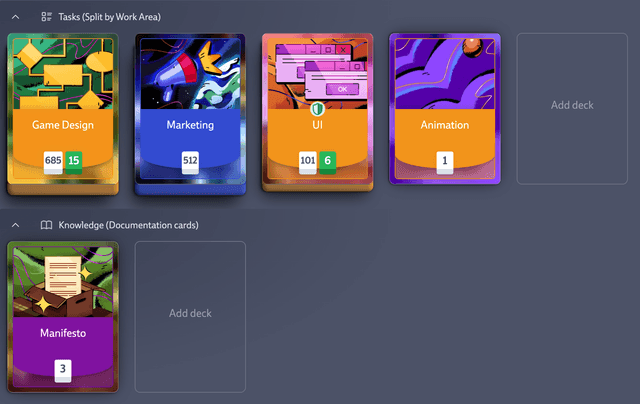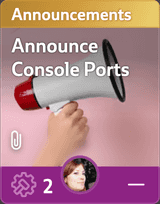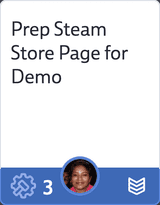
Gonçalo is the Head of Marketing at Codecks. He’s a big Pokémon fan (he has a tiny Bulbasaur right next to his work computer and a big Psyduck in his living room), still raves frequently about how much he loved Shadow of the Colossus (it’s been almost 20 years, Gonçalo!), and truly believes Codecks is *the* tool to turn ideas into videogames.
Codecks is a project management tool inspired by collectible card games. Sounds interesting? Check out our homepage for more information.
From Sprints and Lists to Runs and Decks: How Playfulness in Project Management Drives Efficiency

If you’re reading this, you’re probably someone who a) has made games or b) wants to make games. Which means that, like us, you’ve probably at some point thought about how ironic it is that, even though games are extremely fun to play, they can be… not always fun to make. Being a game developer (or a game designer, game producer, game writer…) is arguably one of the most elaborate jobs out there, in one of the most difficult industries. Creating something as complex as a videogame, whether involving large or small (or even solo!) teams, is no easy task—and needs an immense amount of organization, prioritization, and many other important words ending with -ation (coordination, iteration, collaboration…).
This means, of course: a lot of things to do, and a lot of project management to get them done. Which also means that things can become very messy very quickly—particularly without the right tools or methods. If game development is a marathon, not a race, then project management tools are our sneakers—and, unfortunately, most of them might not be our size.
Game developers know all about this, though, and the importance of having the right project management tools for game development. Taking into account the uniqueness of the gaming industry and the array of tasks, dates, assets, and more that creating a videogame involves, having a project management tool that adapts not just to these tasks but also to the way game developers think is essential. And this is where playfulness in project management comes in.
This idea of playfulness isn’t new: after all, things like gamification in project management have been around for quite some time. There have been literal papers written about how this idea of gamifying project management helps with everything from stakeholder management to driving motivation to performance, and it’s something that’s been increasingly discussed more and more. This also applies, of course, to project management in game development.
The now popular idea of gamification stems from one idea that we believe in very strongly: the idea of playing. We believe playfulness drives efficiency, and that by creating a playful tool for project management you can engage not just yourself, but also your full team. And we believe this is particularly true for game development, where playfulness fits like a glove–in terms of culture, processes, ways of working, and more.
It was this belief around creating a playful project management tool for the gaming industry that made us build Codecks in the first place—we wanted to create the tool that game developers everywhere (including ourselves!) always wanted (needed!), and never had. One that makes work more efficient as well as more fun.
But what are the advantages of a more playful approach to project management, exactly? What does it bring to game development and to project management tools? Let’s have a look.
1) It Increases Engagement and Motivation
We love videogames and you probably do too, so it’s no surprise that the idea of project management as a way of playing can be appealing. Creating a playful environment transforms even the more mundane tasks into something new and exciting, and more playful, visually intuitive interfaces, like card-based systems (such as ours!), make task management more of an interactive experience instead of just a static to-do list. This can make tasks not feel like just a chore, and increases both the engagement and the enjoyment for you and the rest of your team.
If we all love games, then why not make project management for games more like playing the games themselves?? This can make project management more engaging and more fun—and is one of the reasons why we built Codecks.
2) It Helps With Collaboration and Team Dynamics
“It’s dangerous to go alone!” said that old man in the first Zelda game, and we tend to agree. Making games is a lot about collaboration—be it with your team, your players or your community. And when it comes to all of these, having the right project management tool is essential—not just to make sure you and your team work together efficiently, but also that you and your players are connected throughout.
That’s why we built Decky, for example, our bot that connects Codecks directly with Discord, creating a direct line between game developers and their players, helping you gather feedback, ideas, or whatever, really! And we’re also big, big fans of open development in gaming, which is why at Codecks you can share any of your projects publicly, allowing your community to join and interact with anything you’re working on. And by making this sort of interaction more playful and fun, both players and developers are also more engaged—that’s why, at public projects on Codecks, players can upvote their favorite ideas, for example, and win karma points to level up. Creating this sort of playful interaction (with a tool to back it up) not only invigorates your community and your players, but also allows you to work with them through a whole new way of collaboration.
But this all applies to internal project management too, within your team. What else brings a team together more than not just working but playing together, for example? By creating an environment where work can feel like play, you can all work together towards common goals, both bringing the team together while simultaneously driving results. That’s why at Codecks we have a streak system, for example, to both reward and incentivize you and your team for continuous, sustainable progress—and it works.
At the end of the day: playfulness drives efficiency.
3) It Provides Clear Progress Tracking and Roadmap
Progress can sometimes be an abstract, foggy concept. In project management, it sometimes amounts to nothing more than checklists with deadlines—boards and boards of tasks to be done, shown in ways that aren’t particularly interesting or, really, useful.
Taking a new, more playful approach to this, however, opens an entire new universe of possibilities for project management and game development. By using things like card-systems, progress becomes visual, tangible and rewarding, helping us better keep track of both team and individual objectives (along with feeling better when we achieve them!). Codecks’ deck and card system was built in part specifically for this: to help make each task more interactive, playful, visual and clearer. This is also why we call our sprints Runs, instead–we were inspired by dungeon runs!
Highlighting how visible progress is also encourages both accountability and efficiency, which is essential for an area as fast-paced and sometimes (oftentimes??) chaotic as game development. It also allows us to create better roadmaps, and to better understand how close each task or goal is (or isn’t) to completion. This helps the entire team plan and work better in both the short and long run.
4) It’s Perfect For Iteration
When it comes to game development, a lot of it boils down to iteration. Try, try, and then try again. Here, taking a more playful and less traditional approach can make this process more adaptable, collaborative and engaging. By taking a more playful and engaging approach to collecting and implementing feedback, iteration becomes both a lot more efficient and, also, a lot more fun and rewarding. A tool created around this more playful approach and specifically for game development, such as Codecks, can also create systems that not only facilitate giving and receiving feedback, but also systems to give you feedback in real-time, helping you improve as you work. This makes everything faster, easier and, dare we say, more fun between you and your players. This is why our Cards are so adaptable, for example—any of them can be repurposed, changed or reprioritized at any time, adapting easily to any new task or feedback. This system is perfect for agile workflows, for example.
As people who spend so much time making games, we know how painful feedback loops can be, which is also why our card and deck system exists: to help streamline those loops as much as possible, and also make them more engaging (and fun!). This more playful card and decks system approach to project management can also be helpful to break bigger projects into smaller ones, creating iterative and incremental steps—with each step (or each card!) made as engaging and rewarding as the last, while making bigger projects more efficient and digestible. And at Codecks you can give each Card a priority level too, from low to high, ensuring that you and your team can always prioritize and are always working towards the same goals, no matter what.
Basically: by breaking projects down into cards, as you do in Codecks, tasks can be adjusted, reordered, and improved easily. This approach to project management is ideal for game development, where even the smallest of changes can be refined and tested again and again and again. And, of course, it makes things a lot more fun and engaging, too!
5) It’s More Organized and More Efficient
How many to-do tasks do you have in your sprint right now? 10? 20? 30? It’s hard to keep track of every single one, let alone make sure they all get done until the next sprint. And how do you measure or track progress for all these, even?
A playful tool for project management can help with this by using much of what we’ve discussed here: visualization of progress, enhanced collaboration, structured progress tracking with instant feedback, and more. All-in-all, a more playful project management tool just makes things easier, more efficient and, also, more fun. It can help us save time, increase productivity, and make us enjoy making games even more in the process. It’s not just the best way to do project management–it’s also the way to do so that best fits the specific needs of the game development industry.
We love games for a reason: our brains love levels, clear objectives, and to feel engaged. Why not get the same out of our project management tools? Why not make the way we turn ideas into games more like games themselves, transforming project management into something much closer to something we love (playing games!) in the process?
6) Conclusion
Game development will never be easy—all good things need effort, after all. But that doesn’t mean we can’t make it easier, more efficient, more fun, and use tools tailored specifically to our needs. If we love playing games, then why not make our project management tools more playful? After all, that approach is nothing but making project management more like the games we’re all trying to make—and, in the process, making it better for all of us. As game developers, this is exactly why we built Codecks: to create a project management tool for, and by, game developers, as a love letter to the people who pour their sweat and tears into the games we love. This is the tool we always wished we had. We didn’t, so we just built it.
Curious to learn more about playfulness in project management for making games, or try out a tool made with this in mind? Create a Codecks account, and have a first row look at what a project management tool made for game developers specifically can do! Or reach out to us directly, and we’re happy to answer any questions or help in any way we can! We know how hard making games can be, and we’re here to help you succeed anyway we can.


